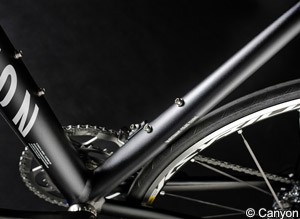German company says that its design was the result of an ‘optimisation algorithm developed over years’
 Following on from a successful ruling at the district court in Dusseldorf on September 14th, Canon Bicycles GmbH has said that it fully expects to win the patent infringement trial against Cervelo at the European Patent Office on November 24th.
Following on from a successful ruling at the district court in Dusseldorf on September 14th, Canon Bicycles GmbH has said that it fully expects to win the patent infringement trial against Cervelo at the European Patent Office on November 24th.
“Based on the facts and the recent ruling in Dusseldorf, we expect a success,” predicted Roman Arnold, founder and CEO of Canyon Bicycles GmbH. “Five years ago we made a contribution to the technical progress of bicycles with the Canyon Maximus Seat-tube. Now we are seeking protection of our invention.”
The statement follows on from an article which appeared earlier this week in Bike Europe, which claimed that the European Patent Office had already ruled against the Canadian frame manufacturer.
That was contradicted by Cervélo co-founder Gerard Vroomen, who pointed out that the hearing was not due to take place until the 24th of this month, and thus the basis of that article was factually incorrect. He suggested that Cervélo would ultimately win, stating that “there are also other actions available to Cervélo in trying to correct the issuance of the patent. When the patent is ultimately withdrawn or invalidated there will no longer be a basis for a court decision against Cervélo and Tridynamic [a former distributor].”
Canyon’s action stems from its claim that Cervélo’s RS, R3 and R3 SL frames copied a design element of its frames. It says that its Maximus Seat-tube, which was ‘designed for maximum bottom bracket stiffness,’ was first used in 2005 on the Carbon Ultimate F10 and Roadmaster F8 series, and that this was ultimately copied.
“The seat tube’s patented shape combines qualities that are otherwise in conflict with each other,” it said in a statement today. “The bottom bracket stiffness, a key factor in the bicycle’s forward drive, has been increased by 20% compared to a round seat tube, without experiencing any significant weight disadvantages. The derailleur’s pivoting range remains, despite the tube’s maximum bearing surface on the bottom bracket. Because the seat tube diameter is reduced towards the junction of the top and seat tube the comfort and lateral stiffness of the frame are in an ideal ratio.”
Canyon said that the design came about as a result of an optimisation algorithm developed over years. It was eventually implemented in frames in 2005 and, according to founder and CEO Roman Arnold, the patent is an important one in protecting Canyon’s interests.
“The property rights implicate a key benefit for our customers,” he said, pointing out that the seat-tube is patented throughout Europe. He said that Canyon holds corresponding patents in the U.S. and in China.
Cervélo’s earlier release argued that the patent should be invalid because of what it said was “prior use and obviousness. It is a combination of features which is believed to be known publicly for many years before the patent application and more recently in very common use by many manufacturers.” It said that it no longer used the design, but that many other companies still do and would be at risk if the final judgement went Canyon’s way.
Both sides are, as expected, predicting that they will win the battle. The European Patent Office will be the one to decide that, though, with that process starting in six days time.